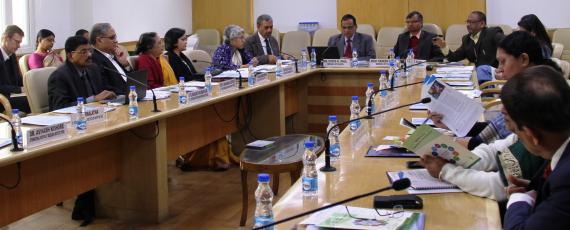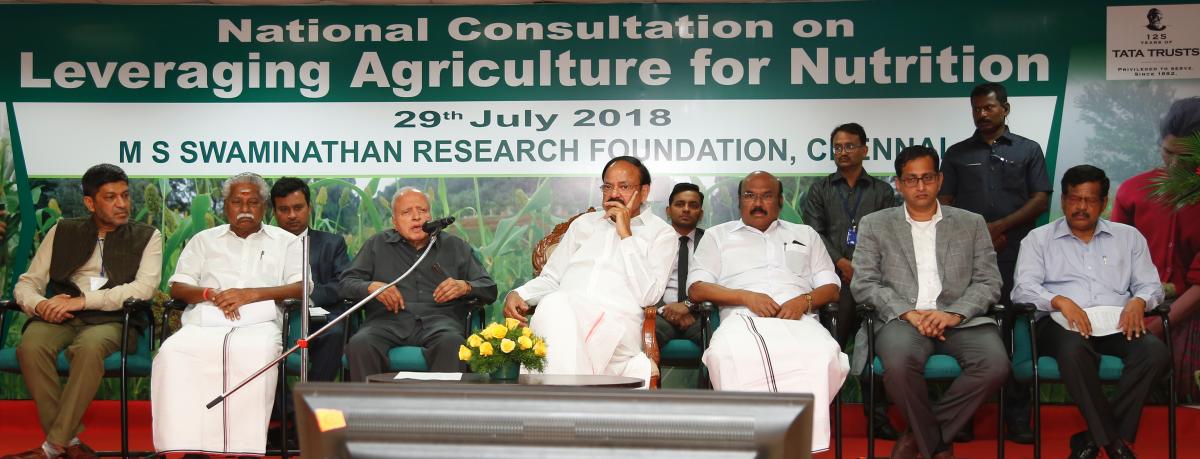Taking the Farming System for Nutrition Approach to Scale

Seven villages in Koraput district in Odisha and five villages in Wardha district in Maharashtra were the sites of the Farming System for Nutrition (FSN) study by MSSRF in India from 2013-18. Emerging evidence from the study points to improved household dietary diversity resulting from a broad-ranging agricultural intervention that focused on increasing availability of nutrient dense crops, nutrition gardens of fruits and vegetables, fishery and poultry as supporting interventions, accompanied by nutrition awareness across the board. There is also evidence of uptake of the approach by farmers 16 other villages in Wardha and 18 other villages in Koraput. Farm men and women from the study villages have emerged as spokespersons at different forums.
FSN uptake in Odisha and Maharashtra
In Odisha, MSSRF had been invited in April 2017 to provide inputs on agriculture for the Odisha Vision document that is in the making[1]. On 20 March 2018, results from the FSN study in Koraput were shared at a meeting chaired by the Development Commissioner and Additional Chief Secretary, Mr. R Balakrishnan in the Planning & Convergence Department, Government of Odisha. The Finance Minister in his speech in the Legislative Assembly on 23 March while presenting the agriculture budget of the State for 2018-19, for the first time used the term ‘nutrition sensitive agriculture interventions’. The government of Odisha also sanctioned funding under the Rashtriya Krishi Vikas Yojana to MSSRF in June 2018 to cover more villages in Koraput under the FSN approach.
In Maharashtra, Dr. K M Nagargoje, Director General of the Maharashtra Council of Agriculture Education and Research (MCAER) visited the FSN study site in Wardha in October 2017 and interacted with members of the village community; he convened a meeting in December 2017 of officials from the four agriculture universities in Maharashtra and Krishi Vigyan Kendras (KVKs) under them, to discuss uptake of the FSN approach. Dr. Lakhan Singh, Director, ICAR-Agricultural Technology Application Research Institute (ATARI) Pune, also participated in this workshop. Subsequently, a consultation on ‘Leveraging Agriculture for Nutrition’ organised by LANSA- MSSRF jointly with the National Institute for Transforming India (NITI Aayog) in January 2018 recommended setting up of FSN models in KVKs across the country and mandated the Indian Council of Agricultural Research (ICAR) to take action. In April 2018, ICAR-ATARI, Pune collaborated with MSSRF to organise a workshop with this objective and brought together selected KVKs from Maharashtra and Gujarat, to plan demonstrations of the FSN model on their campuses.
Supporting the uptake efforts, the Tata Trusts with whom MSSRF has had a long-standing association and whose representatives participated in a national consultation by LANSA MSSRF in July 2016, extended support for advocacy of the FSN approach across Odisha and Maharashtra where the study was already in progress, and in the states of Bihar and Andhra Pradesh. As part of this, following workshops on FSN with district level officials in the four states in 2017, state level consultations were organised in May-June 2018 where experience of the FSN study under LANSA in Koraput and Wardha was also shared. These culminated in a national level consultation on Leveraging Agriculture for Nutrition in India in Chennai on 29 July, 2018. The Vice President of India inaugurated the event and reaffirmed the government’s support for nutrition-sensitive agriculture.

Among the participants were, Mr. R Balakrishnan who in his talk referred to the Odisha government’s commitment to taking forward support for ‘nutrition sensitive agriculture interventions’ mentioned by the finance minister in the state’s agriculture budget for this year; and Dr. Lakhan Singh shared that the KVKs who had participated in the April workshop had begun work on setting up demonstrations of FSN models as part of their action plan for this year.
All these point to the FSN study under LANSA having been able to garner support at multiple levels to sustain and continue beyond the study period.








Add new comment